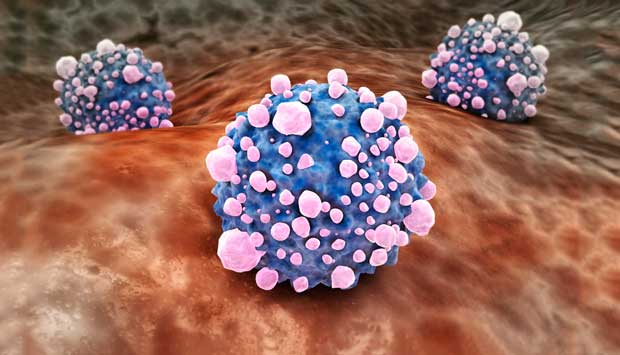
Genetic changes in cancer cells, such as these pancreatic cancer cells, will be much easier to track thanks to a new DNA analysis method developed by A*STAR researchers.
© Stocktrek Images/Getty
A method for analyzing DNA in cells at a deeper level is set to give a clearer picture of the biology of tumors and could revolutionize the way they are treated.
Cancer claims millions of lives every year and researchers are racing to find effective treatments. However, no two cancers are the same, and drugs that are effective for one patient may not work for another.
A reason is that tumors contain millions of cells which all have slightly different characteristics. Understanding the subtle differences between cancer cells could shed light on how they evolve and reveal which treatment is most likely to be effective.
In 2013, Lih Feng Cheow and his colleagues from the A*STAR Institute of Molecular and Cell Biology developed a method for identifying some of these differences, by measuring a cell signature called DNA methylation in single cells.
After writing new scripts for a system which is already used commercially to sequence DNA, Cheow and his team have automated their method to run on microchips that can treat and analyse 96 cells at the same time. They also expanded the method to measure even more cellular detail — DNA mutation and gene expression — concurrently.
The team tested their method to better understand a type of lung cancer called adenocarcinoma.
Using their technique, they could distinguish previously undiscovered signatures. They found that the subset of cells in the population that carried a key cancer mutation exhibited distinct patterns of DNA methylation.
The benefit of this method is that it is user-friendly, says Cheow. “We reengineered a commercial system so that anyone can just get this off the shelf.” After demonstrating the method works, Cheow says, “we’re now working with clinicians to look at the profiles of different cancer cells and to look at drug resistance.”
Cheow believes his method may also find use in clinical laboratories, where it could be used to screen embryos and increase the success rates of in vitro fertilization procedures.
“We want anyone to have easy access to this method and to do great science with it,” he says.
The A*STAR-affiliated researchers contributing to this research are from the Institute of Molecular and Cell Biology, Genome Institute of Singapore, and Bioinformatics Institute.




